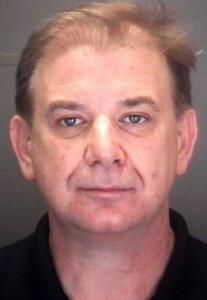Federal prosecutors are showing few signs of letting up on an imprisoned local developer a week before his final sentencing hearing.
The U.S. Attorney’s Office last week requested a 30-year prison sentence for Billy G. Jefferson Jr., according to federal court filings.
That’s seven years shy of the maximum sentence but is nearly triple the minimum time suggested by a probation officer in a presentencing report.
“These extraordinary circumstances warrant an extraordinary sentence, well above the advisory guideline range,” a motion filed Sept. 12 by Assistant U.S. Attorney Michael Gill reads.
The government argues that the 30 years is warranted to punish both Jefferson’s original tax credit scheme and the “breathtaking campaign” prosecutors allege Jefferson crafted to hoard millions of dollars in cash, prepaid gift cards and Las Vegas casino chips.
Prosecutors claim Jefferson has spent or concealed nearly $7 million of $9.3 million he had held in foreign bank accounts at the time of his first arrest on state charges in April 2013. Of that amount, about $4.65 million consisted of illegal historic tax credit money, prosecutors allege.
They claim evidence indicates Jefferson has hidden away a PVC pipe potentially packed with unaccounted-for cash, casino chips and gift cards.
Prosecutors say that money should have been used to pay down the more than $9 million Jefferson owes in restitution.
Jefferson’s defense team says no hidden cash hoard exists and has argued that Jefferson’s extensive spending of his own, unrestrained funds – including three Las Vegas trips – may have been imprudent, but it was not illegal.
In Friday’s filing, prosecutors also drew on another imprisoned Richmond developer’s historic tax credit fraud to come to a final sentencing recommendation.
Justin French, a one-time business partner of Jefferson, was sentenced to 16 years in federal prison in 2011 for orchestrating a similar historic tax credit scheme. He faced a maximum 30-year prison sentence for his crimes, and his final sentence was enhanced by a prior criminal history.
Prosecutors in French’s case asked for a sentence near the low end of a 14- to 17-year recommended range.
But Jefferson’s prosecutors say French cooperated with authorities after his arrest. Jefferson, they say, claimed to be “in full cooperation mode” while carrying his alleged plan to hide assets.
They also add that Jefferson was undeterred by French’s downfall and continued to carry out his own fraud after his partner’s 16-year sentence.
Jefferson and French collaborated on historic tax credit renovations around Richmond, including the Tobacco Factory building at Commerce and Stockton streets in Manchester that brought in more than $5 million in fraudulent tax credits.

The prosecution claims Jefferson used his River City Court apartments, at Hanover Avenue and Nansemond Street, to seek millions in fraudulent tax credits.
Prosecutors claim Jefferson sought another $3.5 million in fraudulent credits on his River City Court project in the year after the French saga ended.
French has paid $2.2 million of an $8 million restitution requirement to date, the document says. And Jefferson has already put down about $2 million towards the more than $9 million he owes in restitution.
Prosecutors say they considered Jefferson’s progress towards restitution in their sentencing request. Had he not made those payments, not agreed to a plea, or spent a larger sum of personal cash, the prosecution said it would have looked for a sentence up to the full 37-year maximum.
Jefferson has pleaded guilty to four federal felony counts, including two related to a multi-million-dollar historic tax credit scheme and another two from an aborted plan to flee the country under his brother’s identity late last year.
He pleaded guilty to one count each of major fraud against the United States and engaging in unlawful monetary transaction last December. Attorneys from both sides then agreed to recommend a 6.5-year prison sentence.
But Jefferson was arrested again in February for violating his bond agreement. And in May he was indicted on three new charges. He pleaded guilty to unlawful transfer of a false identification document and aggravated identity theft after forging IDs using his brother’s personal information and using those documents to arrange a one-way chartered flight to England.
All four charges have since been consolidated into a single sentencing process, and the initial joint 6.5-year sentence recommendation has been thrown out.
The prosecution’s sentencing recommendation comes after a lengthy hearing last week over the report that suggested an 11- to 13- year sentence. Presiding Judge John A. Gibney overruled a pair of objections Jefferson’s defense team made to the presentence report that could have lowered the sentencing recommendation.
A final sentencing hearing is scheduled for Tuesday, Sept. 23. The defense by Thursday will submit its own argument on what sentence Jefferson should receive. He’s represented by Chuck James of Williams Mullen and John Martin of Hunton & Williams.
“We’ll file our response in keeping with the court’s order, but feel strongly that the sentence requested is significantly higher than is warranted in this case,” James said.
Federal prosecutors are showing few signs of letting up on an imprisoned local developer a week before his final sentencing hearing.
The U.S. Attorney’s Office last week requested a 30-year prison sentence for Billy G. Jefferson Jr., according to federal court filings.
That’s seven years shy of the maximum sentence but is nearly triple the minimum time suggested by a probation officer in a presentencing report.
“These extraordinary circumstances warrant an extraordinary sentence, well above the advisory guideline range,” a motion filed Sept. 12 by Assistant U.S. Attorney Michael Gill reads.
The government argues that the 30 years is warranted to punish both Jefferson’s original tax credit scheme and the “breathtaking campaign” prosecutors allege Jefferson crafted to hoard millions of dollars in cash, prepaid gift cards and Las Vegas casino chips.
Prosecutors claim Jefferson has spent or concealed nearly $7 million of $9.3 million he had held in foreign bank accounts at the time of his first arrest on state charges in April 2013. Of that amount, about $4.65 million consisted of illegal historic tax credit money, prosecutors allege.
They claim evidence indicates Jefferson has hidden away a PVC pipe potentially packed with unaccounted-for cash, casino chips and gift cards.
Prosecutors say that money should have been used to pay down the more than $9 million Jefferson owes in restitution.
Jefferson’s defense team says no hidden cash hoard exists and has argued that Jefferson’s extensive spending of his own, unrestrained funds – including three Las Vegas trips – may have been imprudent, but it was not illegal.
In Friday’s filing, prosecutors also drew on another imprisoned Richmond developer’s historic tax credit fraud to come to a final sentencing recommendation.
Justin French, a one-time business partner of Jefferson, was sentenced to 16 years in federal prison in 2011 for orchestrating a similar historic tax credit scheme. He faced a maximum 30-year prison sentence for his crimes, and his final sentence was enhanced by a prior criminal history.
Prosecutors in French’s case asked for a sentence near the low end of a 14- to 17-year recommended range.
But Jefferson’s prosecutors say French cooperated with authorities after his arrest. Jefferson, they say, claimed to be “in full cooperation mode” while carrying his alleged plan to hide assets.
They also add that Jefferson was undeterred by French’s downfall and continued to carry out his own fraud after his partner’s 16-year sentence.
Jefferson and French collaborated on historic tax credit renovations around Richmond, including the Tobacco Factory building at Commerce and Stockton streets in Manchester that brought in more than $5 million in fraudulent tax credits.

The prosecution claims Jefferson used his River City Court apartments, at Hanover Avenue and Nansemond Street, to seek millions in fraudulent tax credits.
Prosecutors claim Jefferson sought another $3.5 million in fraudulent credits on his River City Court project in the year after the French saga ended.
French has paid $2.2 million of an $8 million restitution requirement to date, the document says. And Jefferson has already put down about $2 million towards the more than $9 million he owes in restitution.
Prosecutors say they considered Jefferson’s progress towards restitution in their sentencing request. Had he not made those payments, not agreed to a plea, or spent a larger sum of personal cash, the prosecution said it would have looked for a sentence up to the full 37-year maximum.
Jefferson has pleaded guilty to four federal felony counts, including two related to a multi-million-dollar historic tax credit scheme and another two from an aborted plan to flee the country under his brother’s identity late last year.
He pleaded guilty to one count each of major fraud against the United States and engaging in unlawful monetary transaction last December. Attorneys from both sides then agreed to recommend a 6.5-year prison sentence.
But Jefferson was arrested again in February for violating his bond agreement. And in May he was indicted on three new charges. He pleaded guilty to unlawful transfer of a false identification document and aggravated identity theft after forging IDs using his brother’s personal information and using those documents to arrange a one-way chartered flight to England.
All four charges have since been consolidated into a single sentencing process, and the initial joint 6.5-year sentence recommendation has been thrown out.
The prosecution’s sentencing recommendation comes after a lengthy hearing last week over the report that suggested an 11- to 13- year sentence. Presiding Judge John A. Gibney overruled a pair of objections Jefferson’s defense team made to the presentence report that could have lowered the sentencing recommendation.
A final sentencing hearing is scheduled for Tuesday, Sept. 23. The defense by Thursday will submit its own argument on what sentence Jefferson should receive. He’s represented by Chuck James of Williams Mullen and John Martin of Hunton & Williams.
“We’ll file our response in keeping with the court’s order, but feel strongly that the sentence requested is significantly higher than is warranted in this case,” James said.



